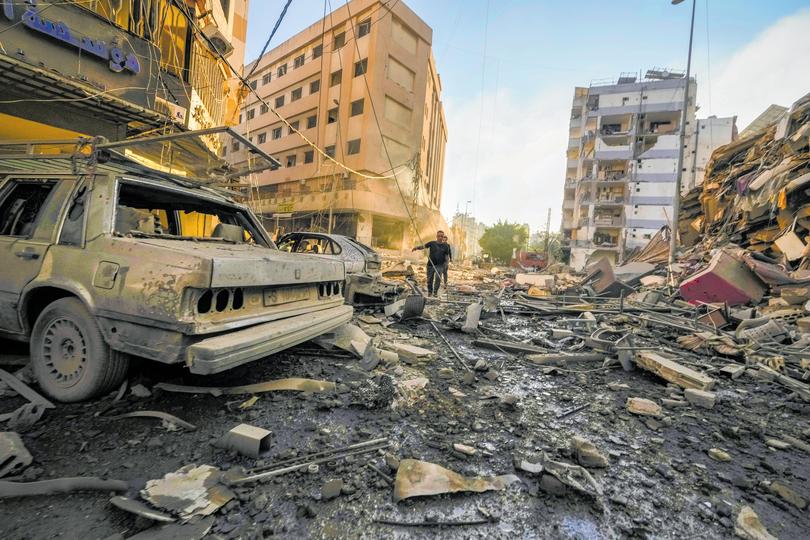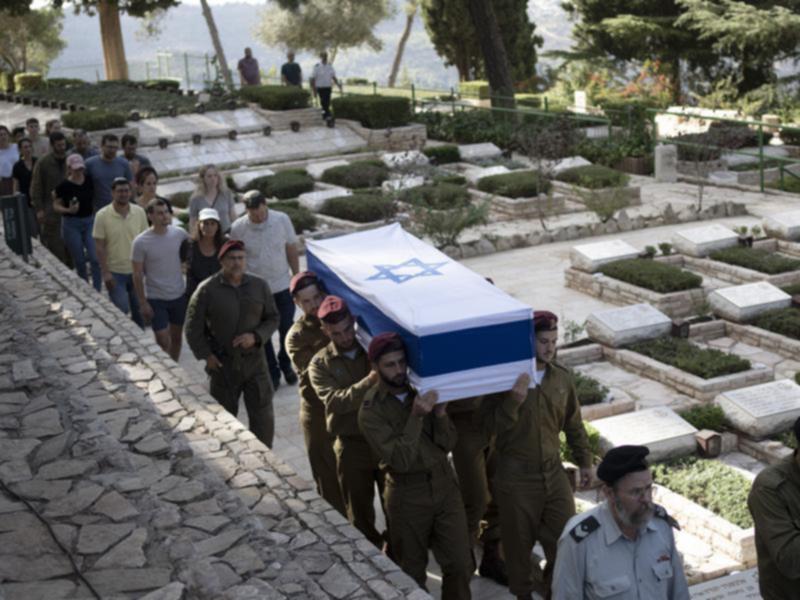THE NEW YORK TIMES: US aims to revive failed UN plan for Lebanon War
At the heart of diplomatic efforts to halt Israel’s invasion of southern Lebanon is a decades-old UN resolution that was intended to demilitarise the area and protect Israel from cross-border attacks.
At the heart of the frantic diplomatic efforts to halt Israel’s invasion of southern Lebanon is a decades-old United Nations resolution that was intended to demilitarise the area and protect Israel from cross-border attacks by Hezbollah.
All parties agree that the measure, Security Council Resolution 1701, has been a complete failure. They also agree that reviving it may be the only way out of Israel’s widening war to its north.
“The outcome that we want to see is the full implementation of UN Security Council Resolution 1701,” the State Department spokesperson, Matthew Miller, told reporters Monday, speaking of Israel’s continuing assault in Lebanon.
Sign up to The Nightly's newsletters.
Get the first look at the digital newspaper, curated daily stories and breaking headlines delivered to your inbox.
By continuing you agree to our Terms and Privacy Policy.Miller said that would mean the withdrawal of Hezbollah forces from the Israel-Lebanon border, and the deployment of U.N. and Lebanese army forces into the buffer zone in southern Lebanon that the resolution had sought to create.
The UN Security Council unanimously adopted Resolution 1701 in August 2006 as part of a cease-fire that ended Israel’s last war with Lebanon.
The resolution called for “an area free of any armed personnel, assets and weapons other than those of” Lebanon’s government and a UN peacekeeping force in the area known as the United Nations Interim Force in Lebanon, or UNIFIL.

In recent days, the question of how to restore that resolution has consumed senior US officials, including Secretary of State Antony Blinken and Amos Hochstein, a senior White House national security aide who has been working for months to broker an agreement between Israel and Hezbollah to restore calm along the Israel-Lebanon border.
Blinken has also been working the phones with Arab officials to discuss Lebanon’s political future, in which U.S. officials hope the influence of Hezbollah, which is backed by Iran, will be diminished.
But even as US, Israeli and Lebanese diplomats hold intensive discussions about how to revive Resolution 1701, they face several daunting challenges.
Chief among them is how to enforce the requirement that Hezbollah fighters remain behind the Litani River in Lebanon, miles north of the border with Israel, a mandate that the group has flouted for years.
That allowed Hezbollah to assemble manpower and munitions within striking range of northern Israel — and enabled it to launch hundreds of rocket attacks into Israel over the past year in solidarity with Hamas since that group led the October 7, 2023, assault on Israel and set off a retaliatory war in the Gaza Strip.
As a result, more than 60,000 residents of northern Israel have fled their homes, which Israeli officials call an intolerable situation.
Tens of thousands of Lebanese also have been displaced by months of Israeli retaliation, a number that has multiplied since Israel launched what it calls a “limited” ground invasion of southern Lebanon on October 1.
A related question is whether Israel can be reassured that it will be safe to withdraw its forces from Lebanon. For years, UN and Lebanese army forces largely stood by and watched as Hezbollah built up a large and deadly presence close to Israel’s border, one that Israel’s military says it is determined to clear out.
One reason for that is what some analysts call a fatal flaw in the mission of the 10,000 UN peacekeepers from 46 countries who make up UNIFIL: They were not empowered to use force against Hezbollah. (Israel drew outrage after three members of the international force were injured by Israeli fire in two separate episodes Thursday and Friday. The UN force has rejected Israel’s call for it to leave southern Lebanon during the invasion.)
In a briefing Thursday, David Mencer, an Israeli government spokesperson, offered a scathing assessment of Resolution 1701 and the peacekeeping force tasked with enforcing it.
“Key to that resolution was the UN deploying a force on our northern border inside southern Lebanon,” Mencer said. “It’s called UNIFIL, and its purpose was to ensure that Hezbollah did not exist between the gap between the Litani River and our northern border.
“They’ve never fulfilled that task,” he added. “UNIFIL have been an abject failure, as evidenced by the more than 10,000 rockets which this country has received from Hezbollah.”
Israeli officials have also long complained that Lebanon’s army, which shares responsibility for enforcing the buffer zone, had no appetite for clashing with well-equipped Hezbollah fighters.
In recent days, US officials have studied how to meaningfully enact Resolution 1701 if Israel and Hezbollah can agree to a cease-fire and Israel withdraws from southern Lebanon.
“The real question is, can it be enforced?” said Matthew Levitt of the Washington Institute for Near East Policy, who has studied the issue for years.
Levitt added that the United States and its allies, including Gulf Arab states aligned with Israel against Iran and Hezbollah, should make clear that they will strongly support Lebanon’s government if it deploys meaningful army forces into the U.N. buffer zone.
“We should communicate that we will have their back, but they’ve got to perform,” Levitt said of Lebanon’s army.
He called this moment a fresh opportunity, noting that Lebanon’s government and army might be less afraid to challenge Hezbollah now that Israel has severely weakened the group.
Resolution 1701 also called for “the disarmament of all armed groups in Lebanon,” not only in the country’s south. That implies demilitarizing Hezbollah entirely — an even mightier task. But at minimum, Levitt said, it will be crucial to crack down on any Iranian efforts to rearm Hezbollah after the current conflict, something the international community failed to do after the 2006 war.
Some Israelis believe that the plight of their fellow citizens displaced from northern Israel has been overshadowed by the October 7, 2023, attacks and the ensuing war in Gaza.
Michael Oren, a former Israeli ambassador to the United States, has brought delegations of displaced Israelis to meet with US officials in Washington.
Top Biden officials pleaded with Israel for the better part of a year not to mount an invasion of Lebanon as they pursued a diplomatic alternative. One proposal Hochstein offered would have had Hezbollah pull back its fighters just 10 kilometres (about 6 miles) from the Israeli border, according to Levitt.
That is only about one-third of the distance from the border to the Litani River, but Israel was willing to support the measure because it marked the outer range of Hezbollah’s weapon of choice for cross-border attacks: the Russia-made Kornet anti-tank missile.

As Hezbollah’s attacks escalated over the summer, along with Israeli counterstrikes, Blinken said Israel had effectively “lost sovereignty” over its north.
In remarks during a visit to Laos on Friday, he said that “Israel has a clear and very legitimate interest” in restoring security for its people there.
Blinken maintains that the best solution is a diplomatic one, and on September 26, the United States advanced a proposal for a 21-day cease-fire between Israel and Hezbollah.
But Israel quickly rejected the proposal and launched what it called a “limited incursion” in southern Lebanon on October 1.
Since then, US officials have not treated the September 26 cease-fire plan as an urgent priority, allowing Israel space to press what has been a surprisingly successful offensive against Hezbollah.
On Wednesday, Miller, the State Department spokesperson, said the United States sees Israel as “having the right to conduct these limited incursions” to weaken Hezbollah and force it to withdraw behind the Litani River.
He noted that restoring Resolution 1701 also required Israeli forces to withdraw from Lebanon to their side of the border.
US and Israeli officials now see an opportunity to translate Hezbollah’s military setbacks into a reduced role for the group, which is also a powerful political party in Lebanon’s government. Lebanon, which has a sectarian power-sharing system, has been unable to choose a president for nearly two years, in part because of Hezbollah’s obstruction.
On Wednesday, Miller said that Washington hoped the crisis could allow Lebanon to “break the stranglehold that Hezbollah has had on the country and remove Hezbollah’s veto over a president.”
Blinken went further Friday, saying that Lebanon’s political future was “for the Lebanese to decide and no one else.”
But he noted the importance of “the state asserting itself and taking responsibility for the country and its future” and that “having a head of state would be very important” for Lebanon.
Over the past several days, Blinken has called the leaders of Egypt, Qatar and Saudi Arabia to discuss how to move that process forward, according to a senior administration official.
“The biggest part of U.S. diplomacy right now is getting a president elected in Lebanon that is competent and internationally respected,” said Edward M. Gabriel, the president of the American Task Force on Lebanon.
In the meantime, Israel fights on, determined to use force where its leaders feel that world diplomacy has failed them.
“We have no territorial aims or ambitions in Lebanon,” Mencer, the Israeli spokesperson, said Tuesday. “In the absence of any diplomatic resolution to stop that rocket fire, we will do the job of pushing Hezbollah back behind the Litani River for the simple objective of getting our people back home.”
This article originally appeared in The New York Times.
© 2024 The New York Times Company
Originally published on The New York Times
